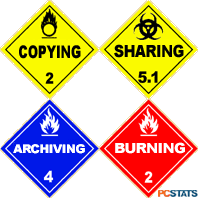Unpaid sharing of MP3s, compressed versions of
commercial musical tracks, long ago reached epidemic proportions due to broadband
Internet and file sharing applications like Napster and Kazaa.
Unlike the software and film industries
which have not offered much unified resistance to piracy, the RIAA (Recording
Industry Association of America) has hit back hard, using the DMCA as a tool.
 From closing down
Napster and Audiogalaxy (two of the premiere music sharing applications that led
the early wave of internet file swapping) to their recent controversial lawsuit
crusade against individual music swapping offenders, the RIAA is taking no
prisoners and is becoming massively unpopular in the bargain.
From closing down
Napster and Audiogalaxy (two of the premiere music sharing applications that led
the early wave of internet file swapping) to their recent controversial lawsuit
crusade against individual music swapping offenders, the RIAA is taking no
prisoners and is becoming massively unpopular in the bargain.
The main issue here of
course is that compressed digital music can be easily transferred from person
to person without cost, consumption of media, or loss of quality.
This makes music swapping an attractive proposition since, as stated before, people
love to share, especially when no personal cost is involved.The RIAA's crusade is intended to add that personal cost,
and thus discourage generosity.
Commercial music is protected by federal copyright laws
which generally prohibit its duplication, except for personal use. There
is no law against converting your legitimately bought CDs, cassettes or LPs into
MP3 files, however.
Since the introduction of the
Digital Millennium Copyright Act, some major music distributors have been adding
various forms of copy protection to their audio CDs, often designed to make
them unplayable in computer CD drives. Though these methods can generally be easily
bypassed, doing so would of course be a violation of the DMCA, and thus of
copyright. One notable circumvent has
the user hold down the shift key while the Audio CD spins up.
'Fair use' of personally purchased
music does not apply to making it available online for download. This is true in
both the United States and Canada. The actual downloading of music is not
technically a violation of copyright in Canada however.
Under the DMCA, copyright holders in the United
States are considerably more able to target violators with civil lawsuits, which
explains why all the current RIAA lawsuits and warnings are aimed south of the
border. This is not to say that music sharing is legal in Canada, however.
There is a false perception that it is, but sharing music files online
is still a violation of Canadian copyright law.
Handling music on your computer
legally
You may copy music you have purchased
onto another medium for personal use, and this includes converting it into
MP3 files for use on your computer or a portable player. Legally, you may
not share these files privately or publicly
over the Internet without violating copyright.
As with software, the Digital
Millennium Copyright Act in the United States makes it illegal to circumvent
copy protection on digital audio media, meaning that if you have purchased a
copy protected audio CD, you may not legally defeat these measures in order to
transfer the audio tracks to MP3s on your computer. Efforts to have this portion
of the DMCA changed have been underway for some time now.

